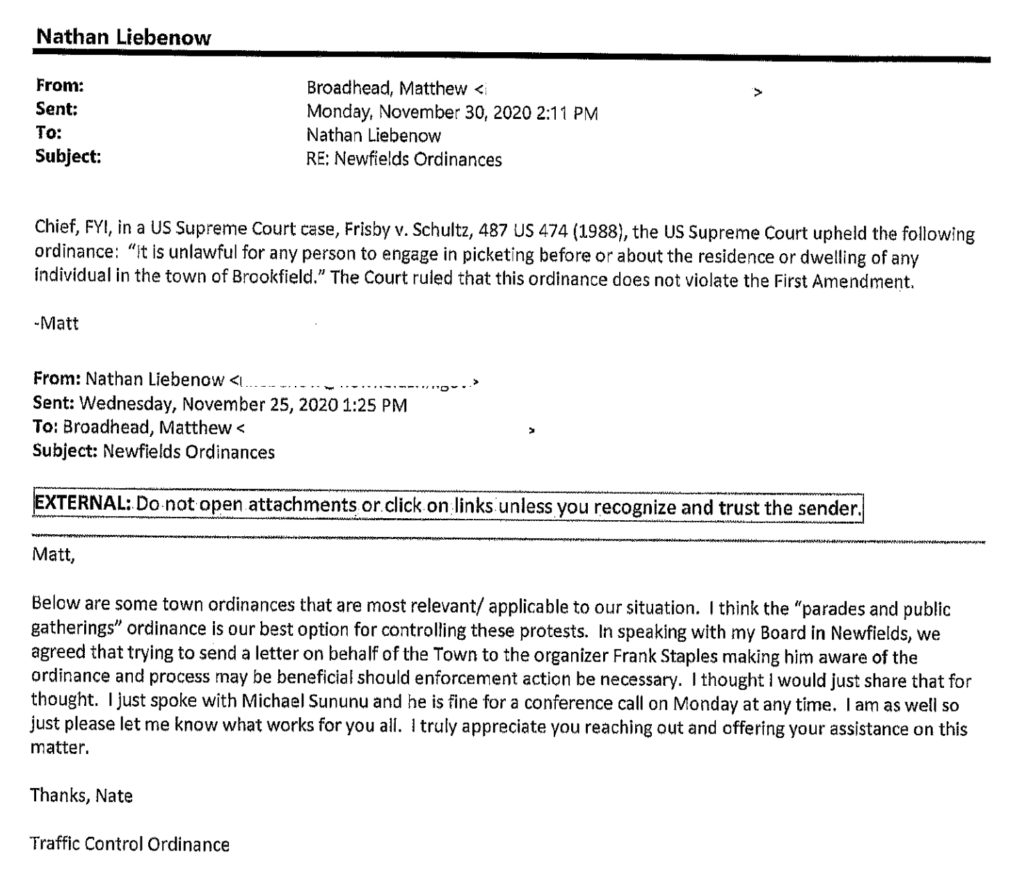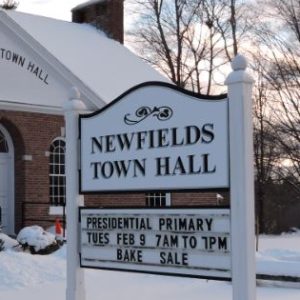Documents obtained by NHJournal reveal communications between the Sununu administration and the Town of Newfields in the days leading up to the passage of an anti-picketing ordinance designed to keep protesters away from his private home.
In December, a spokesperson said the governor “had nothing to do” with the ordinance or its passage.
When Gov. Chris Sununu issued the executive order making New Hampshire the 37th state with a mask mandate, opponents of the governor’s COVID-19 policies responded by taking their protests to the street outside his home in Newfields. Sununu and his neighbors expressed their unhappiness with the crowds of sign-waving demonstrators in their cul-de-sac, but they were on public property.
The town Board of Selectmen, including Sununu’s brother Michael, drafted an anti-picketing ordinance designed to discourage — if not prevent — the protests. Three members of the Sununu administration, including Department of Safety Commissioner Robert Quinn, testified on behalf of the protest ban at a December 8 select board meeting.
What was not known was that the actual language of Newfields’ ordinance came directly from the Attorney General’s Office, according to emails obtained by NHJournal.
The process began with a November 24 email from Michael Sununu to Newfields Police Chief Nathan Liebenow regarding “complaints I have received from several residents on Hemlock [Court] regarding the protests this past weekend,” and suggesting existing town ordinances “which we need to consider enforcing.”
The next day, November 25, Chief Liebenow wrote Senior Assistant Attorney General Matthew Broadhead thanking him for “reaching out and offering your assistance on this matter.” The NH AG’s office usually responds to requests from local law enforcement rather than reaching out and offering assistance.

Chief Liebenow told Broadhead he had been “speaking with his Board in Newfields” about town ordinances that “are most relevant/applicable in our situation.”
On November 30, Broadhead responded by suggesting potential language for an anti-picketing ordinance he believed could pass court muster.
“Chief, FYI, in a U.S. Supreme Court case, Frisby v. Schultz… the U.S. Supreme Court upheld the following ordinance: ‘it is unlawful for any person to engage in picketing before or about the residence or dwelling of any individual in the town of Brookfield.’ The court ruled that this ordinance does not violate the First Amendment,” Broadhead wrote.
That language was eventually adopted word for word by the Newfields select board.
In a statement to NHJournal, NH Office of the Attorney General spokesperson Kate Giaquinto denied the office offered “legal advice” to the Town of Newfields, and simply followed standard protocol.
“Mr. Broadhead provided information about the Supreme Court case, Frisby v. Schultz. This is not a legal opinion or legal advice, it is citing to Supreme Court precedent,” Giaquinto said.
“Beginning in mid-November and after a demonstration was held in Newfields on Sunday, November 29, 2020, the Newsfields’ police chief requested operational assistance from the Department of Safety and the Attorney General’s Office. The Attorney General’s Office is authorized and regularly provides legal counsel to the Department of Safety on issues related to the First Amendment.
In early December, Select Board Chair Christopher Hutchins wrote to his board about the proposed ordinance. “We need to be very cognizant of allowing all to exercise constitutional rights. The protests in town have been peaceful, there have been no parking issues reported, no skirmishes aside from words being exchanged between a protestor and a neighbor from a distance.”
However, he added, he “understand[s] neighbors, residents may be discouraged or upset at the protests.”
A few hours later, Hutchins sent another email to the select board following a call with Broadhead. “Attorney Broadhead indicated that the costs of providing additional resources (Troopers) to the protective detail during planned events in our community is growing with limited funding (Agency is exhausting O.T. funds) wanted to express his hopefulness that we as a governing body will work in an expeditious manner to enact an ordinance that may assist with this situation.”
“I assured him we were working as expeditiously as possible… to crafting the ordinance he had spoken with Derek (Durbin, Newfields’ town counsel) and (Police Chief) Nate (Liebenow).”
Broadhead wasn’t the only member of the Sununu administration with an interest in the ordinance’s progress. The governor’s security detail followed up on November 27, with Trooper Sherry Vestal writing to Liebenow, “just checking in to see if you’ve had any further discussion references (sic) protest and town ordinances?” She also cc’d Scott Frye, who is part of Gov. Sununu’s state police detail.
Newfields’ select board passed the ordinance on December 22, nearly a month after the first protest took place. Governor Sununu’s spokesperson, Ben Vihstadt, said at the time, “the governor had nothing to do with this,” and directed questions regarding the ordinance back to the Town of Newfields.
On December 28, more than 20 state and local police officers were on hand to greet about a dozen protesters who defied the new ordinance. They arrested one and issued nine citations for illegal residential picketing, including one to NHJournal reporter Christopher Maidment who was covering the protest. Maidment repeatedly identified himself as a journalist and wore a press badge, but Newfields police cited him anyway.
The issue of protesting outside a politician’s home appears in a different light a week after a pro-Trump mob ransacked the U.S. Capitol, resulting in at least five deaths. Sununu took the drastic step of canceling his public inauguration and delivering his inaugural address from an undisclosed location.
However, the bigger issue of balancing lawful, peaceful protest and public safety remains.
Some of Sununu’s neighbors wanted to take matters into their own hands, according to one of the emails obtained by NHJournal. “A few families in the neighborhood of Hemlock Court are interested if (sic) leasing the circle at the end of Hemlock Court and possibly the right of way (path) to the Country Store for approximately four months starting this month,” wrote Jeff Feenstra, the governor’s closest neighbor, who also testified in support of the ordinance at the December 8 select board meeting.
Activists could be lawfully prevented from protesting on private property.
A related right-to-know request has been submitted to the Department of Safety by NHJournal regarding their involvement in promoting the ordinance. The department estimates “that approximately 60 days will be reasonably necessary to determine the extent of available records in accordance with RSA 91-A and applicable case law.”
The Town of Newfields provided more than 150 pages of responsive documents to NHJournal in fewer than ten business days.




